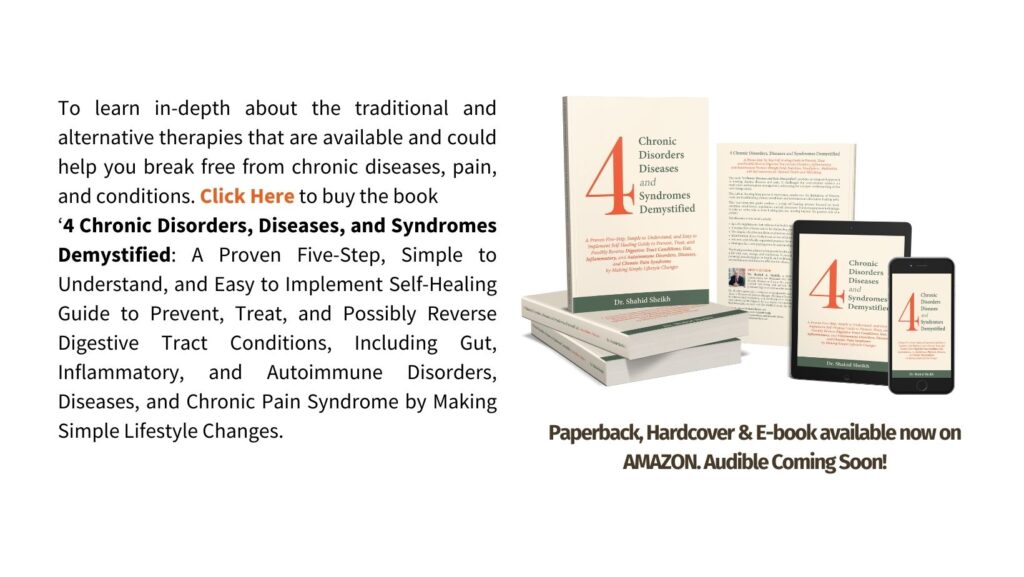How to Break Free from Chronic Diseases, Pain and Conditions for Optimal Health and Wellness
April 4, 2024
In a world increasingly burdened by chronic diseases, the search for solutions has led us back to the very basics of human well-being: our diet. The profound connection between what we eat and our health has never been more relevant. The words of Ann Wigmore, stating that food can either be the safest form of medicine or the slowest form of poison, encapsulate the critical role nutrition plays in our health.
Holistic Self-healing Plan for a Disease and Pain-Free Life
To break free from chronic diseases, pain, and conditions to achieve total wellness, a comprehensive and integrated self-healing plan that incorporates supplements demands a holistic perspective. It involves carefully selecting nutrition, supplements, and a healthy lifestyle. It also includes stress management, regular physical activity, and adequate rest, all of which contribute to the body’s self-healing capacity.

Before you embark on the journey to optimal health and well-being, understanding your overall health-related conditions, their symptoms, and triggers can help you manage them more effectively. Work with healthcare professionals to get a precise diagnosis and a treatment plan that works for you.
The Importance of Professional Guidance
The first step toward a holistic self-healing plan is consultation with healthcare professionals. Their expertise is indispensable when adding supplements to one’s health regimen. Their advice can help tailor a supplement plan that addresses individual needs, mitigates risks, and harmonizes with existing treatments.
Creating a self-healing plan that incorporates supplements demands a holistic perspective. It involves not only the careful selection and timing of supplements but also embracing lifestyle changes that support overall health. This includes stress management, regular physical activity, and adequate rest, all of which contribute to the body’s self-healing capacity.
The adage “You are what you eat” underscores the link between our diet and physical, mental, and emotional health. Food is more than mere sustenance; it is the fuel that powers every aspect of our being. This relationship is not a modern revelation but ancient wisdom validated by contemporary science. Our diet directly affects our gut health, influencing our mood, energy levels, and overall well-being. A balanced diet rich in natural foods like vegetables, fruits, whole grains, lean proteins, and healthy fats can bolster our health and mood and even alter our DNA to foster a healthier life.
A diet abundant in whole foods is foundational to nurturing our bodies. Vegetables and fruits, in their colorful variety, offer a spectrum of antioxidants, while whole grains provide the essential fiber for better digestion and health. Lean proteins, nuts, legumes, and low-fat dairy products contribute to a balanced diet that fuels the body optimally. On the other hand, processed foods, high in sodium and unhealthy fats, should be minimized or avoided to prevent their detrimental effects on our health.
Vitamins and minerals are the building blocks of health, each playing unique roles in supporting body functions. A diversified diet ensures an adequate intake of these nutrients, which are essential for everything from immune defense to bone health. The rainbow of fruits and vegetables, whole grains, and lean proteins provide a natural pharmacy of vitamins, minerals, and other beneficial compounds that synergize to promote health and wellness.
Fiber is crucial for maintaining digestive health, regulating blood sugar levels, and supporting cardiovascular health. High-quality fiber sources include fruits, vegetables, legumes, nuts, and whole grains. Incorporating these into daily meals not only aids digestion but also contributes to a feeling of fullness, helping to manage weight and prevent chronic diseases.
Water plays a vital role in every bodily function. Drinking enough water is essential for your overall health, especially those with chronic conditions. Adequate hydration supports metabolism, nutrient absorption, and detoxification. Incorporating water-rich foods like fruits and vegetables alongside regular water intake ensures that the body remains hydrated and functions efficiently.
As we dig deeper into supplements for chronic diseases and pain management, it is evident that an integrated approach, integrating diet, lifestyle, and supplementation, is paramount for nurturing healing and well-being. This chapter underscores the importance of being informed and intentional about incorporating supplements into one’s health regimen. Supplements, including vitamins, minerals, botanicals, and digestive enzymes, offer a complementary strategy to diet and lifestyle modifications in the battle against chronic conditions and pain.
Creating a self-healing plan incorporating supplements, nutrition, mindfulness, and physical activities demands a holistic perspective. It involves embracing lifestyle changes that support overall health. This includes stress management, regular physical activity, and adequate rest, all of which contribute to the body’s self-healing capacity.
The journey towards wellness often requires more than dietary adjustments; it sometimes necessitates the targeted use of supplements. Whether it is to bolster nutrient intake, combat deficiencies, or alleviate chronic pain, supplements can play a crucial role. However, these supplements must be selected with care, understanding, and professional guidance to avoid potential interactions and ensure their efficacy.
While supplements offer benefits, they cannot stand alone as a cure-all. They work best in a comprehensive approach that includes a nutrient-rich diet. This constructive interaction amplifies the body’s healing capabilities, leveraging the natural properties of foods and the targeted action of supplements to combat disease and promote wellness.
Navigating the vast variety of available supplements can be daunting. Quality is critical, and choosing supplements that have undergone third-party verification can provide reassurance about their purity and potency. Furthermore, understanding when and how to take these supplements can enhance their effectiveness and integration into one’s daily routine.
Exercise is beneficial for every chronic condition. It can help manage symptoms, reduce the risk of complications, and improve mood and energy levels. As health authorities recommend, find an activity you enjoy and aim for at least 150 minutes of moderate-intensity or 75 minutes of high-intensity exercise per week. Always consult your doctor before starting any new exercise regimen, especially if you have a chronic disease.
Chronic stress can exacerbate symptoms of chronic diseases and impact your overall well-being. Techniques such as mindfulness, meditation, deep breathing exercises, and yoga can help manage stress levels. Regular practice can improve your emotional and physical health.
Quality sleep is crucial for healing and health. Aim for 7-9 hours of good-quality sleep per night. Establish a regular sleep schedule, create a restful environment, and avoid stimulants such as caffeine and electronics before bedtime.
The path to healing and managing chronic diseases, pain, and conditions is often a marathon, not a sprint. Supplements, alongside dietary and lifestyle changes, require time to manifest their benefits. Patience, persistence, a positive outlook, and regular progress monitoring are essential to a successful self-healing journey.
Conclusion
In conclusion, supplements can significantly contribute to managing chronic diseases and alleviating pain when used judiciously and as part of a broader health strategy. By focusing on quality, seeking professional advice, and adopting an integrated approach to health, individuals can harness the power of supplements to support their journey towards wellness and improved quality of life. Remember, the goal is not merely to treat symptoms but to nurture the body’s intrinsic healing abilities, paving the way for a healthier, more vibrant life.
Some people find relief from symptoms with complementary therapies such as acupuncture, massage, or chiropractic care. Discussing these options with your healthcare provider to ensure they are safe and appropriate for your situation is essential.
